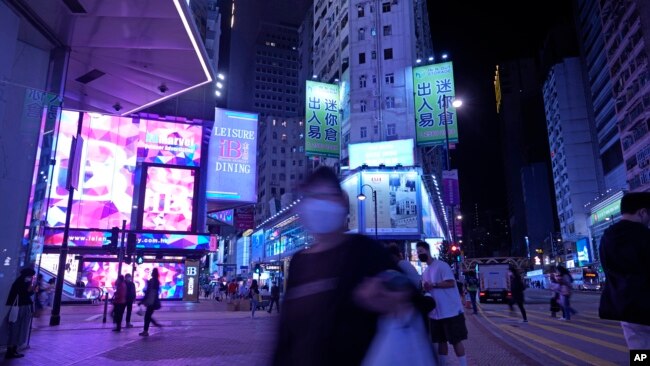コロナ”ゼロ政策”とプラスチックゴミ、香港
次から次へと流れるニュースに思考が上書きされていきます。
Hong Kong!! 共産党に忠誠を誓った議員により支配され、中国ナイズされてから、コロナ政策もやはり本土と同じ。
そこから派生するプラスチック問題、最先端技術を有する中国ですから、きっときっちり、かっちり環境に配慮したプランがあることでしょう!!
経済大国であり世界で一番規律正しく、裕福な国なのですから!!
VOAで今日も英語を学びましょう!!
香港のゼロCOVID政策で大量のプラスチック廃棄物が発生 (和訳)
Hong Kong Zero-COVID Policies Create Tons of Plastic Waste
April 24,2022
香港の厳しい検疫政策は、COVID-19を国境で食い止め、地域社会での蔓延を防ぐことを目的としています。しかし、この政策は経済にダメージを与え、市民の精神衛生に悪影響を与えていると批判されています。環境保護主義者たちは、この政策があまりにも多くの廃棄物を生み出し、環境を傷つけていると言っています。
香港に到着した人々は、検疫ホテルで至る所にプラスチックがあるのを見つけるでしょう。リモコンはプラスチックで包まれ、枕はビニール袋で覆われ、食べ物にはプラスチックの食器が添えられています。
スキンケア会社のオーナー、クレメンタイン・ヴォーンさんは4月4日、香港に乗り入れました。香港を訪れる旅行者の多くは、自由に旅行できるようになる前に、検疫ホテルで14日間滞在することが義務付けられています。
彼女はロイターに対し、検疫ホテルのスタッフは全員、手袋、顔面カバー、ガウンなどの防護服を着用し、ウイルスの拡散を防いでいると語っていました。
「電話機、リモコン、すべてセロファンで包んでいます」と彼女は言います。
香港では1日に2,300トン以上のプラスチックごみが捨てられています。政府の推定によると、リサイクル率はわずか11%で、プラスチックのほとんどは埋立地に運ばれていることになります。
政府の広報担当者は、COVIDが始まって以来、廃棄物が大幅に増加していることを当局が認識していると述べています。政府は、より環境に配慮するよう人々に呼びかけていると言います。
エドウィン・ラウ氏は地元の環境保護団体The Green Earthに所属しています。彼は、COVIDに関する香港の決定は、香港の環境意識の低さを示していると述べています。
「検疫ホテルで生活している人たちは、確定症例ではないのです。」とラウ氏は言います。政府は検疫所から出るプラスチックのリサイクル、つまり再利用を許可するべきだと話します。
香港はゼロCOVID政策をとっている数少ない国の一つです。香港では今年、数万人をCOVID陽性者とその近親者のための建物に隔離しました。
検疫ホテルは廃棄物問題に拍車をかけています。ホテルの宿泊客はロイターに対し、すべての食事がビニール袋に入っていると語っています。
ポール・ジマーマン氏は、選挙で選ばれた地区議員です。公営住宅のように長期的に使用できないため、施設自体も無駄が多いと話します。
「非常に早く建てられたもです。香港の特別な建築基準にも適合して(いない)。」
Hong Kong Zero-COVID Policies Create Tons of Plastic Waste
Hong Kong’s strict quarantine policies are intended to stop COVID-19 at the border and prevent its spread in the community. But the policies have been criticized for damaging the economy and negatively affecting the mental health of citizens. Environmentalists say the policies are also hurting the environment by creating too much waste.
People arriving in Hong Kong will find plastic everywhere in quarantine hotels. Remote controls are wrapped in plastic, pillows are covered in plastic bags and food comes with plastic utensils.
Skincare company owner Clementine Vaughan flew into the city on April 4. Most visitors to Hong Kong are required to stay 14 days in quarantine hotels before they can freely travel in the city.
She told Reuters that all the staff members at the quarantine hotel wear protective covering, like gloves, face coverings and gowns to prevent the spread of the virus.
"The phones, you know, the remote controllers, everything's been cellophane-wrapped," she said.
Hong Kong throws out more than 2,300 tons of plastic waste a day. The government estimates the recycling rate is just 11 percent, which means most of the plastic goes to landfills.
A government spokesperson said officials were aware of a large increase of waste since COVID began. The government says it is urging people to be more environmentally friendly.
Edwin Lau is with local environmental group The Green Earth. He said Hong Kong’s decisions about COVID shows its lack of environmental awareness.
"People living in quarantine hotels, they are not confirmed cases,” Lau said. He said the government should permit the recycling, or reuse, of plastics from quarantine facilities.
Hong Kong is one of the few places that has a zero-COVID policy. It has quarantined tens of thousands of people this year in buildings for COVID-positive people and close contacts.
The quarantine hotels add to the waste problem. Guests of the hotels told Reuters all meals come in plastic bags.
Paul Zimmerman is an elected district councilor. He said the facilities themselves are also wasteful because they cannot be used long-term, like public housing.
“They've been built very quickly ... (and don't) comply with any particular building standards we have in Hong Kong.”
Words in This Story
quarantine — n. the period of time during which a person or animal that has a disease or that might have a disease is kept away from others to prevent the disease from spreading
glove — n. a covering for the hand that has separate parts for each finger
gown — n. a loose piece of clothing that covers most of the body
cellophane — n. a thin transparent material that is used for wrapping things
recycle — v. to make something new from something that has been used before
comply — v. to do what you have been asked or ordered to do
